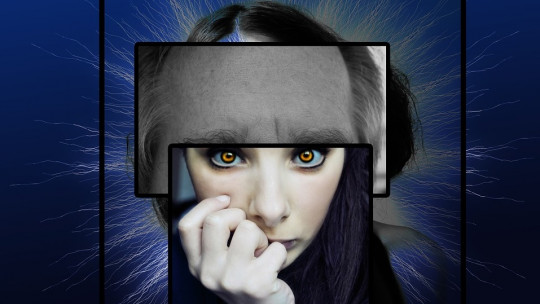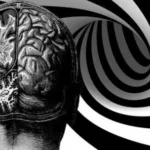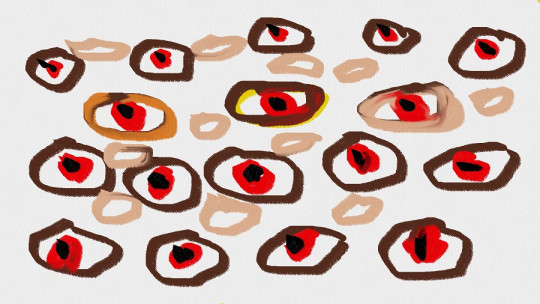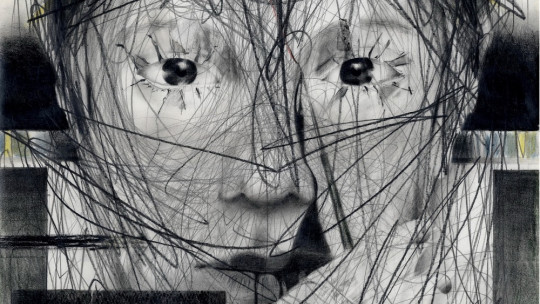There are 6 types of schizophrenia, each of them with particular characteristics: simple schizophrenia, residual schizophrenia, catatonic schizophrenia, undifferentiated schizophrenia, disorganized schizophrenia and paranoid schizophrenia. Schizophrenia is one of the best-known pathologies today due to the complexities it raises. Beyond any definition we have about it, it is important to keep in mind that there are several types of this mental disorder, each of them with some characteristic feature that distinguishes it from the rest. Each schizophrenia has specific symptoms, causes and treatments.
In this PsychologyFor article we will provide you with information about the 6 types of schizophrenia and their characteristics.
simple schizophrenia
Simple schizophrenia is a subtype of mental disorder characterized by appearance of fixed, repetitive and persecutory ideas about the world. In order to establish an adequate diagnosis, it will be necessary to identify certain symptoms:
- Duration of one year or more.
- Hallucinations.
- Delusions.
- Disorganized language.
- Apathy.
- Abulia.
- Lack of attention and concentration.
In this article we explain the difference between delirium and hallucination.
Causes of simple schizophrenia
Beyond understanding the main symptoms, it is interesting to think about the origins that give rise to the manifestations of this type of pathology. Here we will locate the most relevant causes:
- Genetic factors : all those neuronal alterations originate through genetic transmission. In this sense, heredity plays a fundamental role in understanding the vicissitudes of each person.
- Environmental factors : Traumas experienced during childhood can be the starting point for the development of simple schizophrenia. Unpleasant experiences in a person’s life correspond to situations in which it has not been possible to defend oneself from insults or abuse, among others.
To treat simple schizophrenia it is necessary to carry out a psychological treatment that allows ordering the coordinates of the patient’s life using the relevant tools. Likewise, the provision of antipsychotic medication It helps regulate the incidence of delusions and hallucinations that occur.
Residual schizophrenia
Unlike the previously described subtype, residual schizophrenia does not present hallucinations or delusions , among other manifestations. For this reason, it is considered a milder type of schizophrenia. Below we leave you the most frequent symptoms:
- Duration of one year or more.
- motor inhibition.
- Abulia.
- Lack of verbal and non-verbal communication.
Causes of residual schizophrenia
Beyond this type of presentation, it is necessary to distinguish what the causes of the condition may be. Here we will describe them:
- Environmental factors : Like simple schizophrenia, a person’s experiences that determine their personality should not be left aside. Within the most common situations, it is possible to distinguish excessive levels of anxiety and/or stress against which there is a lack of resources.
- Genetic factors : In case a family member has been diagnosed with residual schizophrenia, there is a high chance that the person will develop the same clinical manifestations.
In general terms, it is essential to evaluate each particular case to define the best treatment for each person. In these cases it is usually necessary to resort to psychiatric medication to reduce the intensity of the condition in conjunction with antidepressant and anxiolytic drugs. Likewise, it is essential to establish specialized monitoring with a psychologist to accompany the patient’s life and establish order.

Catatonic schizophrenia
Catatonic schizophrenia shares some symptoms with other types of schizophrenia, however, one of its differentiating characteristics is that It alters motor functions by producing a visible and noticeable deficit
To correctly define the clinical picture, it is necessary to identify some of its most common symptoms:
- Hallucinations.
- Delusions.
- Implausible behaviors.
- Lack of motor activity.
- Mutism.
- Repetitive movements.
- Imitation of another person’s movements.
- Imitation of other people’s speech.
Causes of catatonic schizophrenia
The origins give certain explanations to the physical, emotional and behavioral manifestations of each human being. In these lines, we will point out the causes:
- Genetic factors : Some research has confirmed that the biological factor could be one of the causes of this disorder. In this sense, most research has proven that there are genetic disorders that are transmitted from generation to generation, a fact that can harm the neuronal functioning of each person and, consequently, affect the motor area.
- Environmental factors : certain stressful situations and events in the person’s life may also have contributed to the worsening of the condition.
Despite these difficulties, it is necessary to mention that there are treatments that help improve the quality of life of those who suffer from catatonic schizophrenia. In general terms, psychiatric medication is an essential requirement to control the possible crises that manifest in this mental disorder. In turn, psychological treatment is usually important to set life goals and establish a social bond.
Undifferentiated Schizophrenia
As its name indicates, undifferentiated schizophrenia is characterized by the presence of several symptoms typical of mental illness, but does not fit any particular diagnosis. For this reason, it is necessary to make a distinction with respect to other types of schizophrenia.
Here we leave you some of its most characteristic symptoms:
- Hallucinations.
- Social isolation.
- Abulia.
- Rigid body movements.
- Lack of verbal language.
- Disorganized behavior.
Causes of undifferentiated schizophrenia
Through the detection of these indicators, it is possible to arrive at an adequate diagnosis. Above all, it is important to provide certain details about the reasons that cause undifferentiated schizophrenia. In the following points, we will address this topic:
- Brain accidents : alteration of neuronal functioning due to blows, bruises, strokes, among others.
- Consumption of drugs : The ingestion of toxic substances is another factor that can harm the person who has undifferentiated schizophrenia. In this sense, there are stronger drugs that cause serious damage to the central nervous system.
- Environmental factors : Living conditions are a fundamental core to take into account for these people. At a general level, these are situations of physical and verbal violence, abuse, among others.
Although it is true that undifferentiated schizophrenia is one of the most complex conditions within mental disorders, we currently have certain variables to achieve partial or total remission of symptoms. Due to the severity of the condition, The administration of several antipsychotic medications is usually necessary and establish a psychological treatment throughout life. It should be noted that both spaces should remain in contact to unify criteria and avoid confusion in the patient.
disorganized schizophrenia
It corresponds to a subtype of schizophrenia that stands out for the prevalence of disorganized speech and behavior. As with other types of schizophrenia, disorganized schizophrenia has several symptoms in common with other subtypes of this disorder.
The most characteristic symptoms of disorganized schizophrenia are:
- Incoherent language.
- Strange behaviors.
- Emotional instability.
- Lack of social contact.
- Apathy.
- Abulia.
- Delusions
- Hallucinations.
Causes of disorganized schizophrenia
As has been described previously, it is necessary to understand the origins of each mental illness. In the case of disorganized schizophrenia, we will locate the most relevant causes:
- Genetic factors s: although it is not fully proven, it is estimated that the presence of mental disorders such as depression or psychosis constitute an increase in the development of this type of schizophrenia. In this sense, it is known that alterations in neuronal connections respond to the way external stimuli are processed.
- Environmental factors s: here it is possible to locate consumption of toxic substances, unpleasant life experiences, among others. However, this will depend on each particular case.
Regarding the appropriate type of treatment, the general recommendation is based on the administration of antipsychotic medication to regulate the functioning of the central nervous system. However, this must be reinforced by a adapted psychological treatment to the needs of each patient to set life goals.

Paranoid schizophrenia
Finally, paranoid schizophrenia is characterized by presence of delusions and hallucinations about the world a distinctive feature that may be absent in other types of schizophrenia.
Next, we show you the most common symptoms of this type of schizophrenia:
- Hallucinations.
- Delusions of persecution.
- Altered perception of reality.
- Lack of affection.
- Certainty.
Causes of paranoid schizophrenia
In general terms, the causes of schizophrenia are not completely determined. However, some research has provided accurate data about the origins:
- Genetic factors : genetic inheritance is closely linked to the development of the disease. If a parent was diagnosed with paranoid schizophrenia, there is a high chance that the person will repeat the same pattern.
- Environmental factors : the way of upbringing and the interpretation of events appears as a clear indicator of this pathology. During a person’s life, they may have seen or heard loved ones act in a certain way. If you have a distorted idea of reality, you may imitate these behaviors.
Although these difficulties present serious harm to social and family life, paranoid schizophrenia can be addressed through pharmacological treatment based on antipsychotic medications provided by a mental health professional. In tune with this process, the person should undergo psychological therapy to put together life strategies in the face of complexities that they may go through.

This article is merely informative, at PsychologyFor we do not have the power to make a diagnosis or recommend a treatment. We invite you to go to a psychologist to treat your particular case.
If you want to read more articles similar to Types of schizophrenia and their characteristics we recommend that you enter our Clinical Psychology category.
Bibliography
- American Psychiatric Association (2013). Diagnostic and Statistical Manual of mental disorders (5th edition). Arlington: Panamericana Medical Publishing.
- López Rodríguez, P., Sanmillán Brooks, HE, Cainet Beltrán, AR, Olivares Martínez, O. (2015). Some theoretical considerations related to the study of schizophrenia. Scientific Information Magazine93 (5), 1189-1206.









